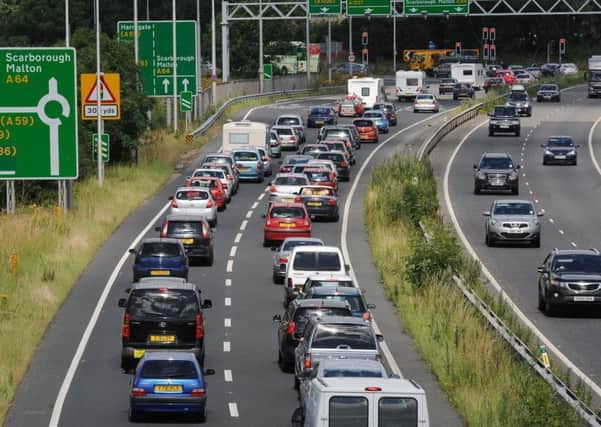YP Comment: Potential must be harnessed - North needs transport funding


The scheme, linking Kent and Essex, is expected to cost £6 billion, while the capital’s new east-west rail line, Crossrail, has a massive £14.8bn budget.
It’s hardly surprising that the influential think-tank IPPR North says £1,500 more per person is being spent on transport schemes in London than northern England, which will only confirm many people’s suspicions that a southern bias exists when it comes to regional transport spending figures.
Advertisement
Hide AdAdvertisement
Hide AdYorkshire is home to a thriving business sector but this risks being undermined by its creaking transport network.
You certainly don’t have to travel far on the region’s congested roads, the A64 from York to Scarborough being among the worst culprits, to appreciate the scale of the problem.
Yet it doesn’t have to be like this. IPPR North makes the compelling case that transport infrastructure projects should “harness the potential of the North” rather than “just reacting to congestion” in the South East.
Investing in ambitious, value for money, schemes in the North of England would go a long way to helping rebalance the economy and would, in turn, ease pressure on the South.
Advertisement
Hide AdAdvertisement
Hide AdBack in January, Mr Grayling told Leeds business leaders: “Great transport created the first Northern Powerhouse nearly two centuries ago, and it can create the second one in the future”.
He was right. But to do so it requires the necessary infrastructure investment otherwise all the talk of a Northern Powerhouse will be just that, talk, and the North-South divide will continue to widen even further.
Kellingley reborn - Former colliery site jobs boost
When Kellingley Colliery shut its gates for the final time in December 2015, it not only signified the end of centuries of deep coal production in Yorkshire and the UK, it marked the burning out of the last dying embers of an industry that once powered the Industrial Revolution and helped build the British Empire.
The closure of the country’s last deep mine was a bitter blow to the men that worked there. The demise of the coal industry in this country has had a devastating impact and while some colliery sites have been transformed into industrial estates or retail parks, others have become a symbol of decline.
Advertisement
Hide AdAdvertisement
Hide AdWhich is why the news that hundreds of jobs could be created at the site of the former Kellingley Colliery is to be applauded. Harworth Group Plc, which owns the land, has reached a deal with Selby District Council allowing redevelopment of the North Yorkshire site which could boost the local economy by £200m.
The 151 acre plot is seen as ripe for investment given its location in the heart of the county and the hope among local businesses and councillors is that these new jobs will replace those lost when Kellingley closed.
Given the struggles that many former pit communities encountered as they struggled to make the transition from heavy manufacturing to hi-tech industry without families being left on the spoil heap, this is a step in the right direction.
Those working behind the scenes in an effort to come up with a viable plan to rejuvenate the former colliery site deserve much credit. And as we begin the Easter celebrations here is a welcome story of hope and renewal born out of despondency and despair.
Wi-fi turn off - Council’s loitering teen fears
Advertisement
Hide AdAdvertisement
Hide AdIt shows how much the world has changed. There was a time when it was lager louts hanging around outside local community buildings that frightened people. Now it appears to be loitering teenagers who want to use the free wi-fi.
In response to this Leeds Council has started turning off the wi-fi in some of its public buildings during the evening following several reports of anti-social behaviour.
However, this comes just weeks after the council announced that parts of the city would be getting free superfast broadband as part of its much-vaunted drive to bridge what it called the “digital divide”.
While not in any way condoning anti-social behaviour, shouldn’t we be encouraging youngsters to engage with digital technology rather than cutting them off from it?
And perhaps if there were more free wi-fi access points in the city they wouldn’t need to gather outside public buildings late at night. Surely that would be a better solution?